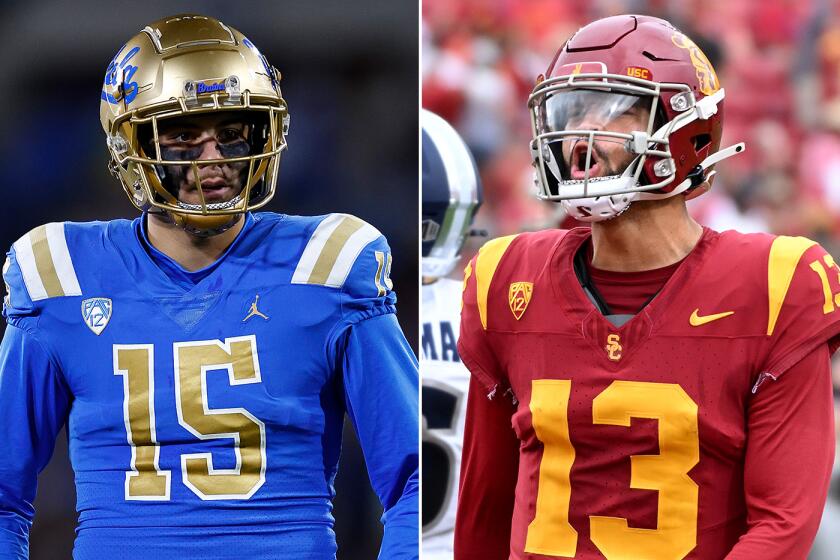Rating the sports commissioners
Staff writer Helene Elliott ranks the sports commissioners:
David Stern, NBA
Still The Man, though the NBA has hit some potholes. Stern imposed the lockout to overhaul an economic system he says led 23 of 30 teams to lose money. Barring a quick agreement, the opening of training camps in early October will be jeopardized as will an on-time Nov. 1 season start.
“I see him trying to make financial sense out of a game that’s not making financial sense anymore. He’ll endure the criticism and he’ll endure whatever it takes to fix the game,” said Bill Sutton, associate director and professor in the DeVos Sport Business Program at the University of Central Florida.
Sutton worked for the NBA’s marketing and business arms for seven years, but his esteem for Stern is widely shared.
Robert Boland, professor of sports business at New York University’s Tisch Center, said Stern is “the one who is held in the greatest awe” among commissioners for resuscitating the NBA and building global appeal through the Olympics.
The labor battle could be one of Stern’s final crises, since he will be 69 on Thursday.
“He’s in the arena. And that’s the challenge. That’s the one place that’s hard,” Boland said. “Stern’s legacy is as one of the five or six or seven most important people in the development of sport.”
Roger Goodell, NFL
The NFL recently announced a $15.2-billion renewal of its “Monday Night Football” deal with ESPN, an increase of 73% over the old deal. Team owners are virtually guaranteed no worse than breaking even before they open their stadium doors thanks to revenue that has grown from $7.5 billion when Goodell took over from Paul Tagliabue in 2006 to a projected $9.5 billion this year. A league-record 107.4 million TV viewers tuned in during its extended opening weekend, Sept. 8-12.
Isn’t that enough to make you say Goodell is No. 1?
“Others would look at Roger Goodell and probably say that he woke up on third base, from all his advantages,” Boland said.
“You give Roger Goodell fairly high grades for bringing football back and for the most part managing his lockout in a way that it did very little harm to the game overall. They lost no regular season-games and, if anything, they created interest in the preseason games because we were worried about it. So sometimes even what you’d perceive as a crisis turns out to be pretty good.”
Scott Rosner, associate director of the Wharton Sports Business initiative at the University of Pennsylvania, believes it’s too early to judge Goodell even after a successful labor negotiation. “The short term, it looks like on paper the owners did better financially, the players did better from a quality of life perspective,” Rosner said.
Mike Slive, Southeastern Conference
and Larry Scott, Pacific 12 Conference
SEC schools, buoyed by five straight Bowl Championship Series titles, shared a record $220 million in revenue this year according to the al.com website. Part stems from 15-year, $3-billion TV deals with CBS and ESPN signed in 2008.
“I think Mike Slive is a very forward-looking commissioner,” Boland said. “I think some of the advantage that the SEC enjoys is that they live in an area that’s growing in population and relatively growing in wealth from where it used to be in the ‘60s and ‘70s and they don’t compete tremendously with pro sports. They’ve grown in importance by being a powerful fish on a relatively comfortable part of the ocean or smaller pond.”
Slive previously was the first commissioner of Conference USA, drawing Sutton’s notice. “He’s done a fantastic job,” Sutton said. “Through his body of work there they’ve expanded, and what he’s been able to do with the SEC with expansion is going to change the tables.”
Scott, hired 2 1/2 years ago from the Women’s Tennis Assn., steered the Pac-12 through expansion and realignment and to a 12-year, $3-billion TV deal with ESPN and Fox. He said in May that the conference could earn $1 billion over the next seven to 10 years through its new media arm and its own network.
“He’s taken the Pac-12 from the Dark Ages to the cutting edge in a very short period of time,” Rosner said. “So if you’re grading based on the last quarter, the latest semester, you’d say it’s him.”
Bud Selig, Major League Baseball
He’d rank lower among Dodgers fans who curse the day he allowed a heavily leveraged Frank McCourt to buy the club. But Selig has served owners well, growing gross revenue from $1.4 billion in 1995 to $7 billion in 2010.
“Bud Selig, on some levels, has been maligned in some circles as an owner who got appointed commissioner and was an acting one for a long time,” Boland said. “On the other hand, you can look at baseball and go, ‘Hey, this sport has weathered the economy pretty well.’ They’re in a pretty strong state and they weathered a great crisis in the performance-enhancing drug crisis and have come through a fairly horrible recession economically not too terribly badly off.”
Sutton was less kind.
“No matter how they try and spin it, we can sit here and pick which teams are going to be in the playoffs every year. There are more haves and have-nots in baseball than in any other sport,” Sutton said. “I think there’s things that can be done, but he doesn’t want to disrupt the status quo. He’s afraid of taking a chance on a lockout and he’s afraid to be an aggressive commissioner that could solve this issue.”
Gary Bettman, NHL
He earned a dubious distinction in 2004 as the first commissioner to cancel a season, but he got the hard salary cap and economic reforms owners demanded. He backed fan-friendly rules that improved play and benefited when the Canadian dollar grew stronger.
But teams learned to exploit loopholes in the labor deal by giving out long-term contracts with low cap hits, and some teams will lose money by staying at or near this season’s $48.3-million salary floor. Several teams are for sale, and the Atlanta Thrashers relocated to Winnipeg. The league had to rescue the Phoenix Coyotes from bankruptcy and has operated the franchise for nearly two years.
“I think there’s a bit of unfair criticism thrown his way. That said, there have also been missteps,” said Rosner, a longtime Philadelphia Flyers season-ticket holder. “The Sunbelt strategy has not worked and you’re seeing market corrections now. Frankly, it hasn’t worked well. They call it ‘non-traditional hockey markets,’ and that’s sort of code for places where people aren’t in love with the sport of hockey unless their teams win.”
Don Garber, Major League Soccer
He smartly steered his teams toward playing in soccer-specific stadiums and managed expansion to 20 teams next season. The TV package will principally move to NBC’s networks next season, available to twice the number of homes as on the Fox Soccer Channel.
But the quality of play and TV ratings must improve, and Garber must find someone other than David Beckham to turn soccer into America’s favorite spectator sport.
“I think Garber has done a fine job and he’s bringing soccer into the American consciousness,” Sutton said. “Time will tell. He’s taken it to where it is now, but it still has a long way to go.”
Tim Finchem, PGA
The Professional Golfers Assn. Tour is a different animal with Tiger Woods than without. Lately it has suffered from his absence, though Finchem recently announced lucrative new TV deals with NBC and CBS that will run through 2021.
Finchem has lost and replaced sponsors and is looking toward greater globalization.
More to Read
Get our high school sports newsletter
Prep Rally is devoted to the SoCal high school sports experience, bringing you scores, stories and a behind-the-scenes look at what makes prep sports so popular.
You may occasionally receive promotional content from the Los Angeles Times.







